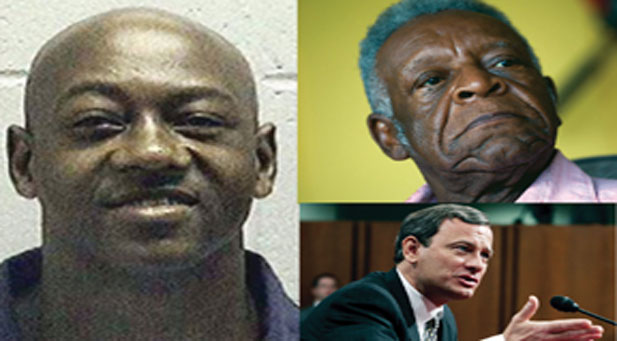
 Supreme Court unanimously upholds principle that every person counts in redistricting
Supreme Court unanimously upholds principle that every person counts in redistricting
NAACP Legal Defense Fund statement in response to Supreme Court’s decision in Evenwel v. Abbott
NEW YORK, NY — Today’s Supreme Court decision in Evenwel v. Abbott secures a major victory for voting rights and preserves a fair, stable rule for state and local governments, which may continue to rely on an inclusive “one person, one vote” standard that has long governed redistricting efforts. The decision also affirms one of the key principles—representational equality—which the NAACP Legal Defense and Educational Fund, Inc. (LDF) has long supported before the Supreme Court and in jurisdictions throughout the country.
Evenwel involved a sweeping attempt to redefine how redistricting is conducted and to undermine a bedrock constitutional principle that every citizen counts. Specifically, the appellants, two white voters from rural counties in Texas, asked the Court to force states to apply a new, nebulous “eligible voter” standard, as opposed to a total population count, in drawing state and local electoral districts. The use of an ill-defined “eligible voter” standard had the potential to confer second-class status on millions of people, particularly those living in urban areas in the United States, including children, people on the path to citizenship, those not registered to vote, and individuals unable to vote due to racially discriminatory felon disfranchisement laws.
Upwards of 75 million children, 13 million of whom are Black and, thus, not yet eligible to vote, would be have been counted out of the redistricting process had appellants pre-vailed. Indeed, appellants’ case threatened to take America’s redistricting process back to nefarious periods in our democracy similar to when Black people were counted as 3/5ths of a person for redistricting purposes and expressly excluded from the body politic.
The Court’s decision today vindicates the “one person, one vote” standard, which rightly takes into account Censusderived total population counts when apportioning voting districts. This standard has been applied universally for over 50 years by all 50 states and the thousands of localities within them. Moreover, this clear understanding of “one person, one vote” is already regarded as America’s “de facto national policy” in legislative redistricting, enjoying overwhelming, bi-partisan support among state and local governments.
Today’s decision reaffirms the guiding logic of this inclusive standard, which fosters access to electoral representation and constituent services for all people, regard-less of race, sex, citizenship, economic status, or other characteristics, or whether a person chooses to or is able to vote.
Justice Ruth Bader Ginsburg, writing for the Court, made clear that “[a]s history, precedent, and practice demonstrate, it is plainly permissible for jurisdictions to measure equalization by the total population of state and local legislative districts.” Justice Ginsburg further stressed, as LDF had urged in its amicus brief supporting Texas and the Court has repeatedly held, that “districting based on total population serves both the State’s interest in preventing vote dilution and its interest in ensuring equality of representation.” As the decision explained, “[n]onvoters have an important stake in many policy debates—children, their parents, even their grandparents, for example, have a stake in a strong public-education system—and in receiving constituent services, such as help navigating public-benefits bureaucracies. By ensuring that each representative is subject to requests and suggestions from the same number of constituents, total population apportionment promotes equitable and effective representation.”
In rejecting a contrary argument, Justice Ginsburg pointed out that “[a]dopting voter-eligible apportionment as constitutional command would upset a well-functioning approach to districting that all 50 States and countless local jurisdictions have followed for decades, even centuries,” and there is “no reason for the Court to disturb this longstanding use of total population.” Importantly, the Court strongly signaled that it would be difficult to demonstrate another constitutionally permissible method of counting population for redistricting purposes that would not violate the “one person, one vote” standard and other traditional redistricting principles.
Janai Nelson, LDF’s associate director-counsel, hailed the decision: “More than 50 years ago, the U.S. Supreme Court, beginning with Gomillion v. Lightfoot, followed by Reynolds v. Sims, and through today, held that the Equal Protection Clause of the Fourteenth Amendment of the U.S. Constitution requires that legislative districts be substantially equal in population.” Ms. Nelson added, “Today, the Court has wisely — and unanimously — upheld this longstanding, unbroken line of cases, and recognized that the ‘one person, one vote’ standard has helped realize the constitutional promise of inclusion and equal access to America’s representative bodies.”
“Prior to Gomillion, Reynolds, and the Voting Rights Act, states used racially discriminatory tactics, such as electoral apportionment schemes, literacy tests, poll taxes, and outright prohibitions on suffrage, to exclude Black people from the political process,” said Leah Aden, LDF Assistant Counsel and its lead attorney on Evenwel. “As a result, elected officials often ignored racial minorities in the making of important policy decisions that impacted their daily lives. It is only through the Civil War, key constitutional amendments, years of litigation, and other advocacy that America has begun to overcome these obstacles to equal access to representation and to count every individual when electoral districts are drawn. Today’s decision is affirmation of that history.”
Founded in 1940, the NAACP Legal Defense and Educational Fund, Inc. (LDF) is the nation’s first civil and human rights law organization and has been completely separate from the National Association for the Advancement of Colored People (NAACP) since 1957—although LDF was originally founded by the NAACP and shares its commitment to equal rights. In media attributions, please refer to us as the NAACP Legal Defense Fund or LDF.




Be the first to comment